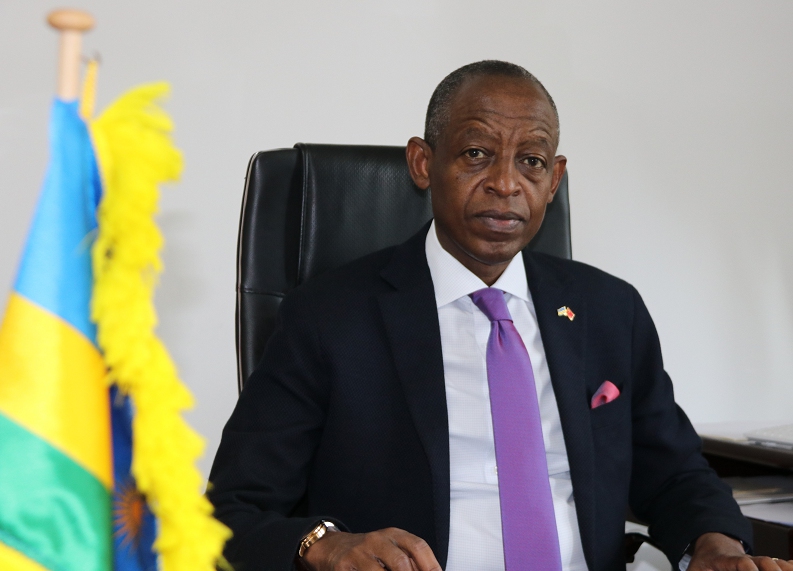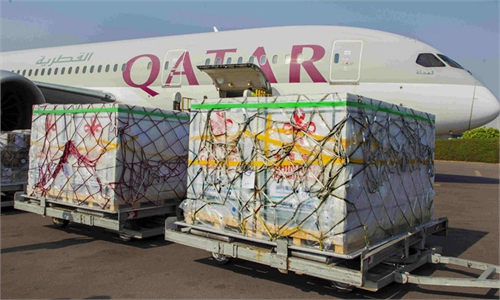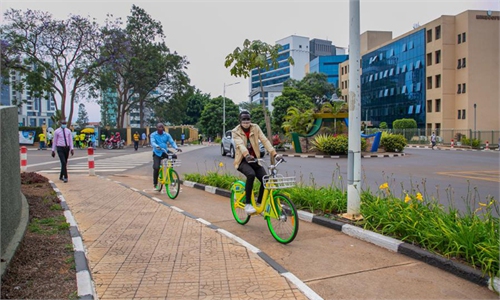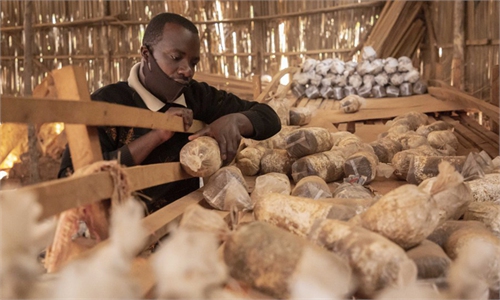IN-DEPTH / DIPLOMATIC CHANNEL
African countries content with cooperation with China; accusations against China-Africa relations ridiculous: Rwanda Ambassador

James Kimonyo, Rwanda's ambassador to China
Editor's Note:The year 2021 marks the 50th anniversary of the establishment of diplomatic relations between China and Rwanda and the two countries have witnessed close cooperation over the past years. Rwanda is now also actively participating in China's e-commerce industry helping local people improve their livelihood.
Global Times reporter, Xie Wenting (GT), asked James Kimonyo (Kimonyo), Rwanda's ambassador to China, about his opinions on bilateral relations, China-Africa cooperation as well as his views on the malicious attacks against China-African relations, in an exclusive interview.
GT: This year marks the 50th anniversary of the establishment of diplomatic relations between China and Rwanda. How do you evaluate the current status of bilateral relations? What's your expectation for continued future ties?
Kimonyo: Diplomatic relations were established on November 12, 1971. Since then, so many things have happened. I should say that from 1990s, we have seen a lot of momentum in diplomatic relations with China, especially in the aftermath of what had happened in Rwanda in 1994. China was among the first respondents in terms of supporting Rwanda's recovery.
Our cooperation is hinged on mutual trust which ensures that our people work together to improve their livelihoods. China, in that sense, has contributed significantly in numerous sectors, starting from infrastructure to health, education, trade, agriculture, development and many more. Rwanda has continuously supported China in the international forum. Every time when there is a global challenge to be addressed, Rwanda is on the side of China. I should say this is a time when we should be able to tell the story of how successful our diplomatic relations with China have been.
As Rwanda's ambassador to China, my role is to nurture friendship with China, and ensure that we deliver on the aspirations of the people of Rwanda and China. My focus is to make sure that this friendship continues from people to people, government to government, and company to company with the purpose of delivering on aspirations. We have seen great results because of cooperation with China. China and Rwanda are improving the livelihoods of our people through investment, trade, and education. We're happy that the Chinese government has been incredibly supportive of our transformation agenda.
GT: How do you evaluate China's role in Rwanda's fight against the COVID-19 epidemic?
Kimonyo: Rwanda stood with China when China was attacked by the virus. When Rwanda reported its first case, China was also struggling to deal with the virus and trying to contain it and save lives. But at the same time, China has looked outside of its borders to lend support to other nations, including Rwanda.
I should say, once again, China was among the first to support Rwanda by providing personal protection equipment and our government was also able to purchase other necessary supplies from China. Chinese scientists were among the first to actually come up with vaccines, such as Sinopharm and Sinovac, and others that followed. China provided vaccines to different countries, including Rwanda and we are in the process of getting more from China. Apart from the actual materials, there are also other projects on which we have cooperated. Medical teams in Rwanda from China are working closely with our teams to make sure that they provide the expertise that is necessary to contain the virus.
Chinese vaccines are effective and protect people. I don't agree at all with the accusation that Chinese-made vaccines are ineffective, which is a result of politicizing science.
GT: This year marks the 100th anniversary of the founding of the Communist Party of China (CPC). Based on your own observations in China, how do you evaluate China's development under the leadership of the CPC over the past 100 years?
Kimonyo: I should say that what the CPC has done and continues to do for this country is unparalleled in the history of political parties, because this is a party that has saved this country from misery and despair to prosperity. Take a look at that journey and look at every 5-year plan and what this country has delivered, and types of reforms have been undertaken. The party has the reform structure within itself. The party is able to deliver prosperity to this country. I have had interactions with CPC leaders from different parts of China and I have seen the right policies have been implemented that targets people who are in terrible conditions in order to change their lives.
And the numbers speak for themselves. Lifting more than 800 million people from poverty is not a joke. It's not only a contribution to China, but also a contribution to the world. In just a little over 40 years, this country jumped to where it is today.
But it's also important, as you speak about cooperation between China and Africa, to mention something that is not often spoken of. China started supporting African countries even before it became what it is today. China was doing that long before it even became the second largest economy in the world. That was the vision of CPC that even though I'm still hungry, if there is someone who is almost dying because of starvation, they are to receive assistance. This is a story of a win-win cooperation, and building a community with a shared future for mankind is not a political statement. It is something that the CPC believes in. So I just want to say congratulations to the people and the CPC. What this party has done to the Chinese people is something to emulate.
GT: What useful experience do you think Rwanda can take from China's development?
Kimonyo: There are so many best practices that people are learning from the CPC and from China. One important best practice is strategies of poverty eradication. I looked at how they look at poverty because initially the idea of poverty reduction is just making sure that people get better homes and get out of terrible living conditions. But China looks at it from a broader perspective - health and education. When you have access to education, then the poverty reduction is going to be taken care of. And that's a model that helps so many other countries that are struggling in that process. We visited model villages where you have the rural transformation. Housing schemes that help people leave terrible living conditions behind to better places where they have access to infrastructure and also income generating activities that can be supported by the government, allowing people to eventually stand on their own two feet.
The second and equally critical point is the economic model. The reforms that were taken by China and the industrial parks that continue to be developed today in different provinces, special processing zones, and free trade ports that are being established across this country is a model worth being emulated by other countries. Besides this, the type of governance system and appointing the right people to the right positions is also important. If you're civil servants, you have to deliver. If you don't, give way to other people. Those three points are key. There are so many best practices that one can learn. China was once just like Africa and it's GDP was even below some African countries. However, through reforms and the right economic models, it has bypassed these countries.
And we like the approach that China says we cannot teach you a lesson and we don't want to teach you a lesson, but we can share our experience, which is a very humble way of helping someone with a lot of humanity.
GT: You once sold Rwanda products through live-streaming platforms in China. Could you share with us more about how Rwanda has actively been participating in China's e commerce industry? What kind of products sell best on China's e commerce websites?
Kimonyo: We are aware that the digital economy plays a very significant role in the world economy. The global economy is now linked in terms of readiness and preparedness. Rwanda has invested heavily in technology because before you participate in the digital economy, you must have access to the internet and infrastructure, and the applications that go with that. A lot of Chinese companies have come on board. Alibaba was the first to Rwanda to set up a trade platform, which was the first on the African continent. The platform gives you access to the global market for your products. Subsequently, we have brought our products to the Chinese market.
I myself have participated in the live-streaming activities. I have to acknowledge the fact that live-streaming has become a very effective tool to engage consumers, show them your products, give them information about the brand, and more. My own experience has been very successful because every time we do a live stream, the next day, what you see is calls and emails requesting for samples and wanting to buy Rwanda products. As for the Chinese consumers, they know Rwanda chili, coffee and tea.
I should have mentioned that even though e-commerce was a tool before the COVID-19 era, now because of this pandemic it has become even more important. We think this is a space that is going to expand. Rwanda is looking forward to continue working with China and Chinese companies to make sure that people have access to these tools and people can order all these products online and can be able to transfer money online. This has increased sales.
GT: How did Chinese companies get involved in the process of helping Rwanda build infrastructure for a digital economy? Some countries expressed concerns over Chinese companies participating in the internet infrastructure building citing so-called security reasons. What's your take?
Kimonyo: A number of Chinese companies are helping us, including Huawei. Actually, we are going to implement a project with Huawei called smart education. This is a project that is going to connect about 6,000 schools. So they have access to internet and teaching materials, which were difficult for them to access. This is a very important project. Huawei is there ensuring that there is access to information, which is very key when you talk about e-commerce.
We have Star Times, a big Chinese company in the satellite television industry. They started from Rwanda and spread to other parts of Africa. We are also in negotiation with a company trying to build an electronic payment system similar to Alipay.
Cyber security is something that China is concerned just like other countries including Rwanda. But it can't be about one company. It can't be about Huawei. We are comfortable with Huawei and other Chinese companies that are developing the internet system, the intelligence, and other things that we want.
GT: Some Western media outlets claimed that Chinese projects in some African countries are facing a backlash in terms of public sentiment. What's your response? How do Rwandan people view the presence of China in your country?
Kimonyo: Rwanda views China as a genuine friend, and a genuine friend is a friend who tells you the truth when things are not going on well. Things that we will say are congratulations. We work on the basis of mutual respect. As I just mentioned, China has never ever imposed upon any African country that I know of. China has always invested in and supported projects that are based on the country's national priorities. So the issue of backlash, for me, is just ridiculous. It has no standing in any political discourse because you don't have any reason whatsoever to say that the Chinese projects are receiving backlash.
Let me give an example. Let me compare companies from other parts of the world and companies from China when they compete for a project. Chinese companies do the same high quality job at half the price. So for me, it's a campaign against China which I don't like, because we work with Chinese companies and we've seen what China has done. We have no issues with China and China has never imposed any project.
GT: How do you evaluate the cooperation between China and African countries? Some people accused China of being too aggressive in Africa and putting Africa into the debt trap, and of fanning flames of neocolonialism. What's your response?
Kimonyo: African countries are very happy with the China-Africa cooperation, because when I look at China and the African continent, what does China do? China comes to Africa to help Africa bridge the infrastructure gap, which is very important for economies. China comes in handy in terms of supporting infrastructure, road, supply, and so on.
The accusations against China have no basis whatsoever. I just gave you an example of Rwanda, we borrow money from different financial institutions, and China's debt share for Rwanda is not more than 9%. 91% is from these other institutions. How do you say China is making Rwanda to fall into the debt trap? Most of the money brought from China went to public investment. What is public investment? Hospitals, schools, roads, and power generation. You cannot say those things are not giving you economic benefits.
I'm speaking from a point of authority as an ambassador that represents a country that is working with China. We don't borrow senselessly; we don't just borrow money and then squander it. No, we borrow money for the projects that contributed to the economy and the changing of lives. African countries think, plan, and want to shape our destiny and we know the projects we need. Frankly speaking, the African continent is content with its cooperation with China.
You can't colonize when you don't put on conditions. China asked what your priorities are in a very humble way. When you show your priorities, then they are ready to support. At times we engaged with friends from the other parts of the world and were asked about the same question, and you tell them, if you think that China is aggressive, we don't think it is aggressive. We actually need it.
As for African countries, China invested here back in the 60s when these countries received their independence. It's about friendship with Africa that has existed.



